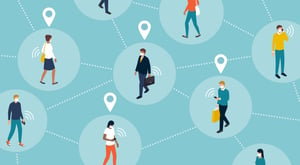 Scammers are posing as COVID-19 contact tracers and attempting to trick people into handing over their payment information, NPR reports. The scammers are using phone calls, texts, and emails to tell people that they’ve recently been in contact with someone who was diagnosed with COVID-19, and they ask for financial information before they continue. While a real contact tracer may text you to let you know that they’ll be calling shortly, Montana’s Attorney General Tim Fox said they’ll never ask for payment info. Additionally, texts from real contact tracers won’t contain links to click.
Scammers are posing as COVID-19 contact tracers and attempting to trick people into handing over their payment information, NPR reports. The scammers are using phone calls, texts, and emails to tell people that they’ve recently been in contact with someone who was diagnosed with COVID-19, and they ask for financial information before they continue. While a real contact tracer may text you to let you know that they’ll be calling shortly, Montana’s Attorney General Tim Fox said they’ll never ask for payment info. Additionally, texts from real contact tracers won’t contain links to click.
“Contact tracing is an important part of managing the spread of COVID-19,” Fox said. “Unfortunately, there are scammers trying to profit from the confusion and fear surrounding the coronavirus. Don’t give out any financial information, and never pay someone who claims to be a contact tracer. Legitimate contact tracers will never ask for payment.”
Crystal Watson, a senior scholar at the Johns Hopkins Center for Health Security, told NPR that contact tracers will ask you to confirm your address and date of birth in order to avoid disclosing sensitive health information to the wrong person. However, they won’t ask for more sensitive information, like your Social Security number.
Another sign of a scam is if the caller gives you the name of someone who tested positive for COVID-19, or if they say they’ll tell you the name after you give them your information. A legitimate contact tracer won’t give out the identity of the person who tested positive.
Dr. Georges Benjamin, executive director of the American Public Health Association, told NPR that people should always be suspicious when a caller asks for personal or financial information.
“Anytime someone calls you for information, you should be concerned about who is calling,” Dr. Benjamin said. "If they are legitimate, you can say, ‘Give me your name and phone number’ and you can always call them back.”
Most people are unfamiliar with this process because they’ve never been called by a contact tracer before, and scammers are predictably exploiting the confusion. New-school security awareness training can teach your employees to verify any unsolicited communications.
NPR has the story.
 Security Awareness Training is critical to enabling you and your IT staff to connect with users and help them make the right security decisions all of the time. This isn't one and done. Continuous training and simulated phishing are both needed to mobilize users as your last line of defense. Request your one-on-one demo of KnowBe4's security awareness training and simulated phishing platform and see how easy it can be!
Security Awareness Training is critical to enabling you and your IT staff to connect with users and help them make the right security decisions all of the time. This isn't one and done. Continuous training and simulated phishing are both needed to mobilize users as your last line of defense. Request your one-on-one demo of KnowBe4's security awareness training and simulated phishing platform and see how easy it can be!




